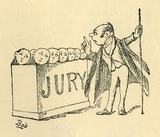Case Update

The only US Supreme Court decision last week, and the 11th of the term, was in a case involving Medicare reimbursement. That was far overshadowed, however, by the Big News: Clarence Thomas spoke in an oral argument, for the first time in six years. Exactly what he said is lost to the ages, though; according to the official transcripts, his remark was "Well -- he did not -- (laughter)," but the accounts of observers seem to pose the possibility that it was more. The comment came during an exchange between Scalia and the lawyers for Jonathon Boyer, who sat on Louisiana's death row for five years waiting for the state to come up with funding for two attorneys for him. Scalia suggested that one attorney might have been enough, especially since she was a graduate of Yale's law school. The thinking is that Thomas, also a graduate of Yale, might have made some self-deprecatory remark about that not being an indicium of competence. Not exactly up there with Abbot and Costello's "Who's on first," but it may be that Scalia and Thomas can take their act on the road.
That fact from the argument (which I'll discuss in more detail later this week) also highlighted another point. Scalia is from Harvard, as are Breyer, Kennedy, Kagan, Ginsburg, and Roberts; Thomas is a Yale grad, as are Sotomayor and Alito. Yep, that's nine. Whatever ideological or demographic diversity exists on the Court, there certainly isn't any educational diversity.
The Court did grant cert in several cases last week, most notably Bond v. United States. I wrote about Bond's case two years ago. The short version is that after spreading some toxic chemicals on the doorknob and car handles of her former best friend, upon learning that former best friend had become pregnant from an affair with Bond's husband, Bond found herself convicted in Federal court and sentenced to six years in prison under a statute intended to implement the 1993 Chemical Weapons Convention. Bond contended that the Federal statute violated the 10th Amendment in creating an offense that was an unconstitutional appropriation of powers reserved to the states, but the 3rd Circuit held she lacked standing to raise the argument. The Supreme Court reversed, but the 3rd Circuit affirmed the conviction again. The case does offer the possibility of the Court's coming to grips with what has been the growing Federalization of the criminal law. As demonstrated by the affirmance of Rajah Baylor's conviction and 12-year sentence under the Hobbs Act for robbing a Little Caesar's in Cleveland a few years back, many offenses which would have been treated as state crimes can now be handled as Federal violations.
At any rate, nothing more from the Court until late February, when they'll resume oral arguments. There will be decisions in the interim, no doubt, and upcoming petitions to decide in a conference on February 15. One of them will be a lawsuit filed by Birther Queen and Nutcase Extraordinaire Orly Taitz seeking to have Barack Obama declared ineligible for the California ballot because he's not a natural-born citizen. (The California ballot from last year's election, and yes, that ship does seem to have sailed.) The celebratory news references from the fringe are not leavened by any understanding of the Court's procedure; there are claims, including by Taitz, that this will be an actual hearing at which the justices will weigh the evidence. Of course, Taitz's petition will be one of several hundred which will be disposed of at the sitting, with only a handful getting serious discussion. Taitz having been shot down 22 previous times in an attempt to get her claims before the Court, the chances of her being lucky on the 23rd are about the same as Sylvester Stallone's being cast in a Shakespeare revival. "To be... or what?"
Down in Columbus, no significant decisions, but a couple of interesting orders on death penalty cases. The court ordered briefing to proceed in State v. Hardin, which was being held for the decision in State v. Craig. Both are death penalty cases. Whoops, were; Craig died a couple of weeks ago, aborting his date with the executioner, and so now Hardin's case can proceed. In State v. Wogenstahl, the court sets the date for the defendant's execution in another capital case. Interesting Point No. 1 is that the date is almost 28 months away -- May 14, 2015. The other is that Justice O'Neill dissented, announcing his opposition to capital punishment as being a violation of the Cruel and Unusual Punishment Clause. This puts him in the company of Justice Pfeifer, who announced over a year ago that he could no longer support the law that he'd helped write. That could pose some serious problems for the prosecution in death penalty cases to come: going into a seven-member panel knowing that two are already against you isn't the most heartening prospect.
The dearth of cases from the appellate courts continues. Only about twenty criminal cases last week, and none of any significance. In fact, no What's Up in the 8th tomorrow, since the court's output consisted of four criminal cases, and two of them were on motions to reopen for ineffective assistance of appellate counsel. Instead, we'll talk about lesser included offenses. I know it'll be hard to sleep with that to look forward to in the morning, but do you best.
Comments